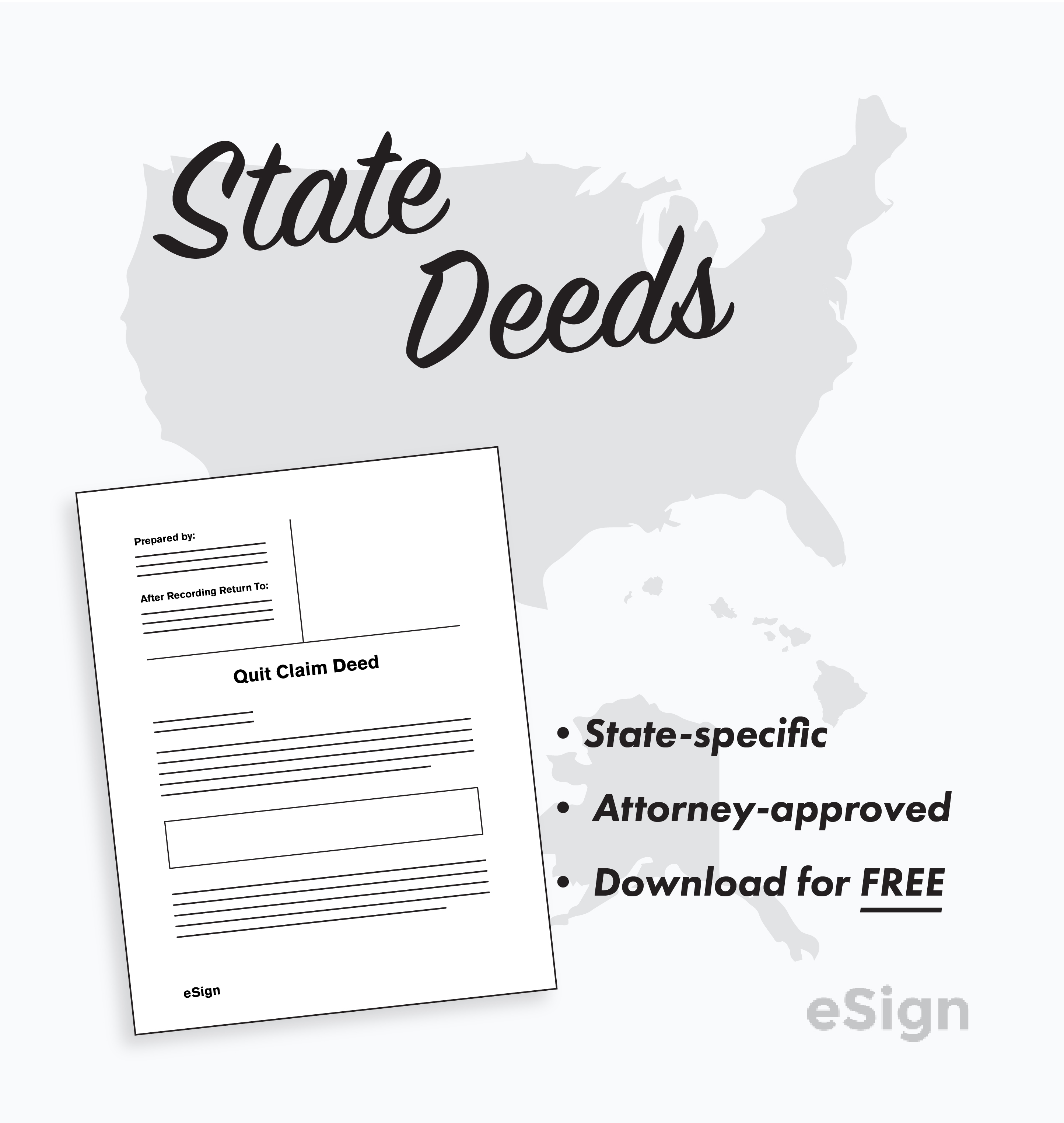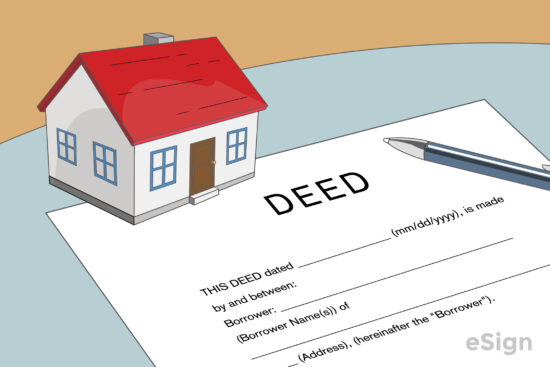By State
- Alabama
- Alaska
- Arizona
- Arkansas
- California
- Colorado
- Connecticut
- Delaware
- Florida
- Georgia
- Hawaii
- Idaho
- Illinois
- Indiana
- Iowa
- Kansas
- Kentucky
- Louisiana
- Maine
- Maryland
- Massachusetts
- Michigan
- Minnesota
- Mississippi
- Missouri
- Montana
- Nebraska
- Nevada
- New Hampshire
- New Jersey
- New Mexico
- New York
- North Carolina
- North Dakota
- Ohio
- Oklahoma
- Oregon
- Pennsylvania
- Rhode Island
- South Carolina
- South Dakota
- Tennessee
- Texas
- Utah
- Vermont
- Virginia
- Washington
- West Virginia
- Wisconsin
- Wyoming
By Type (6)
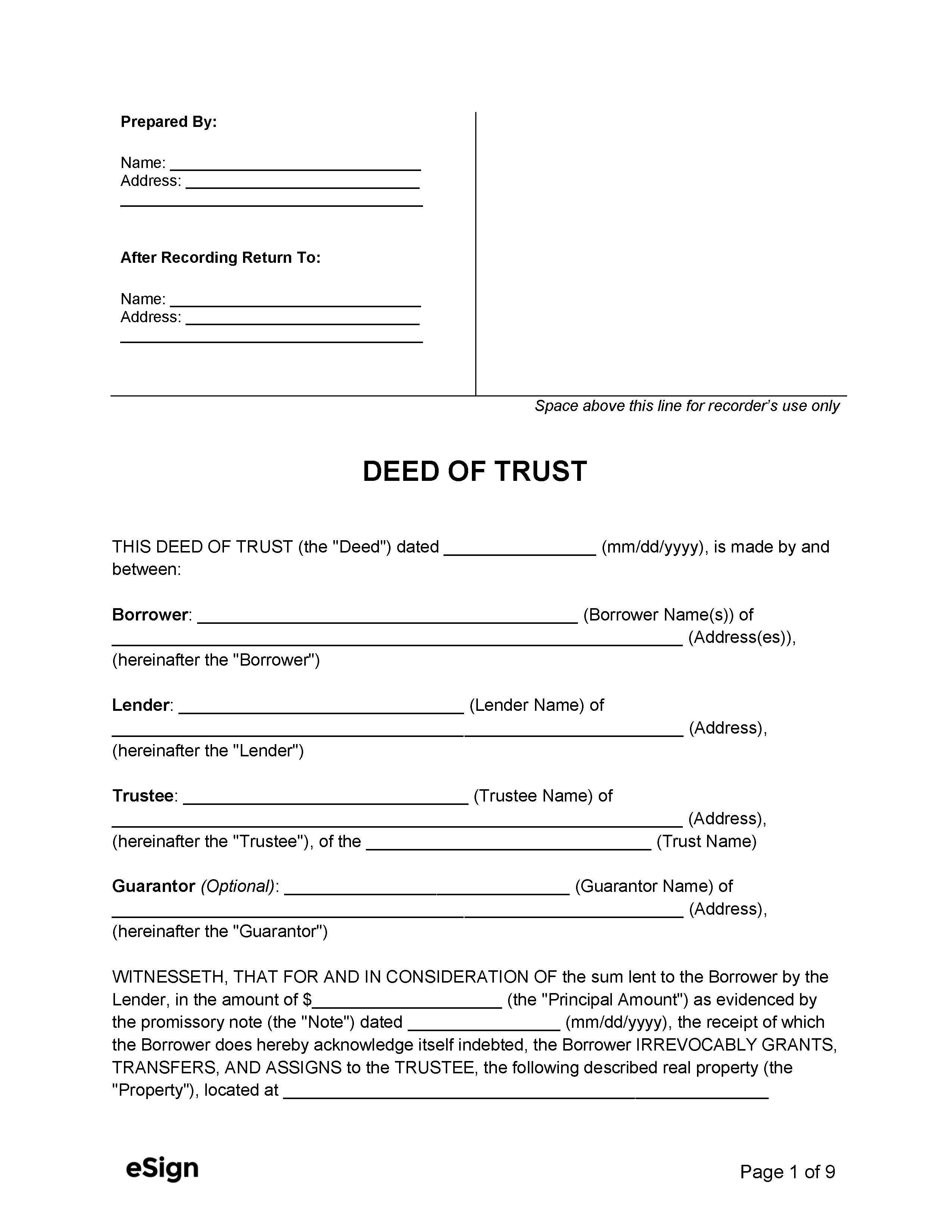 Deed of Trust – Transfers the property title to a trustee as collateral until a home loan is repaid by the borrower. Deed of Trust – Transfers the property title to a trustee as collateral until a home loan is repaid by the borrower.
|
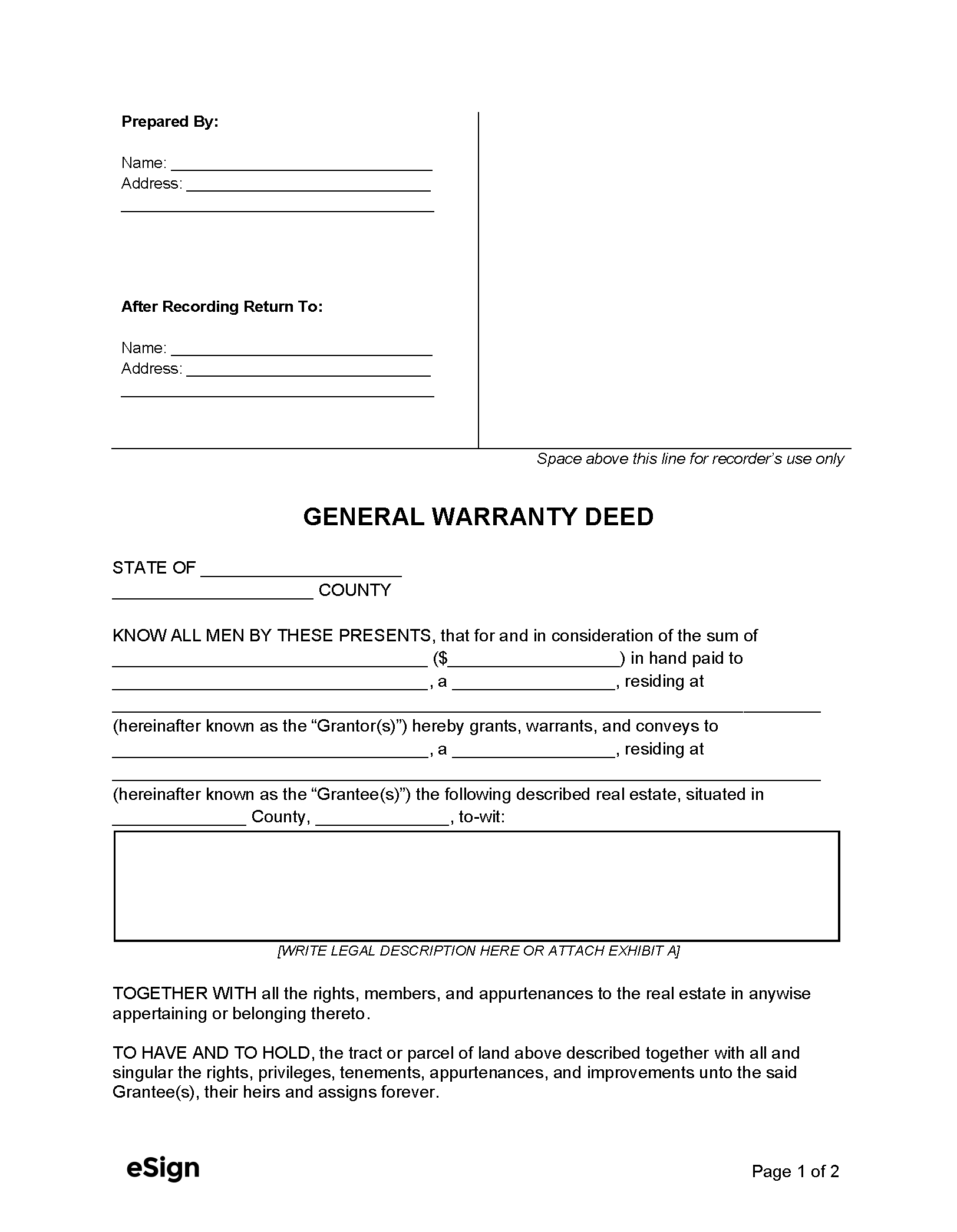 General Warranty Deed – Guarantees that the grantor has the right to transfer and that the title is free of defects and encumbrances. General Warranty Deed – Guarantees that the grantor has the right to transfer and that the title is free of defects and encumbrances.
|
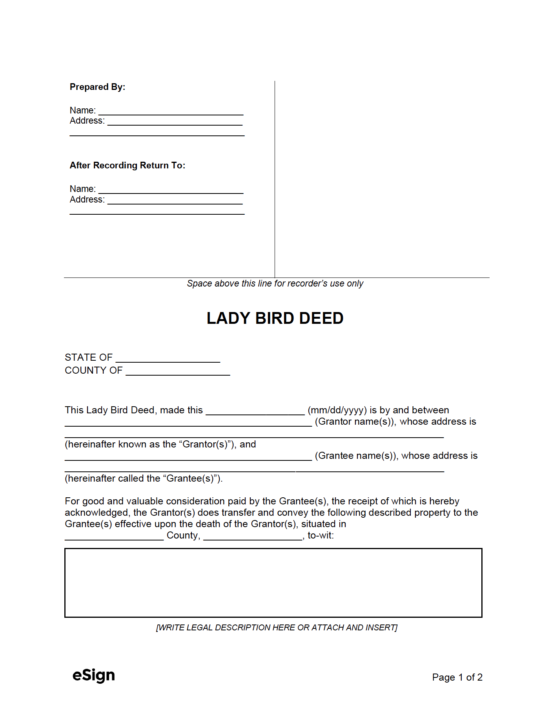 Lady Bird Deed – Names a beneficiary to receive the property after the owner dies. Permitted in Florida, Michigan, Texas, Vermont, and West Virginia. Lady Bird Deed – Names a beneficiary to receive the property after the owner dies. Permitted in Florida, Michigan, Texas, Vermont, and West Virginia.
|
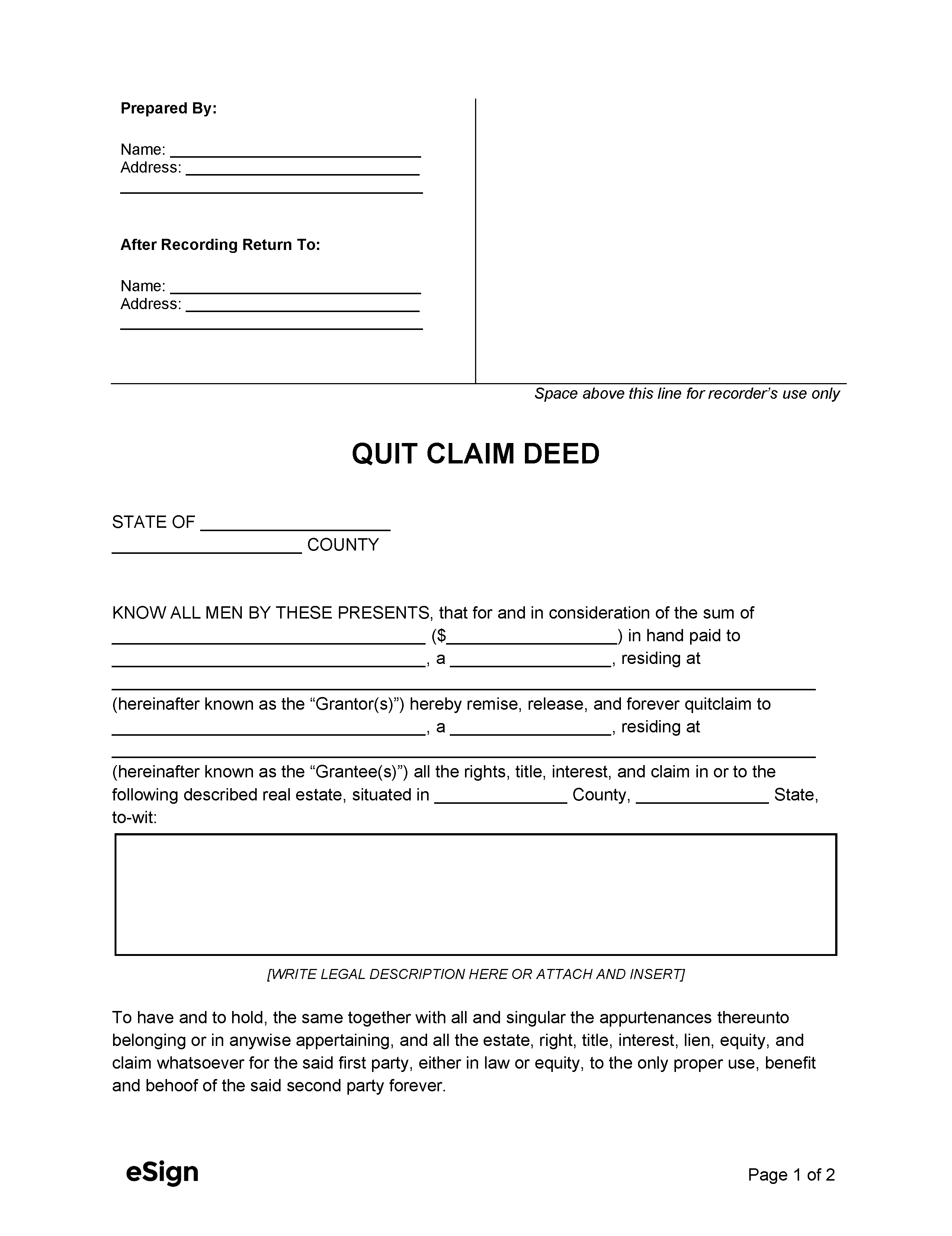 Quit Claim Deed – Offers no protection for the grantee with regard to the quality of the title and assurances of ownership. Quit Claim Deed – Offers no protection for the grantee with regard to the quality of the title and assurances of ownership.
|
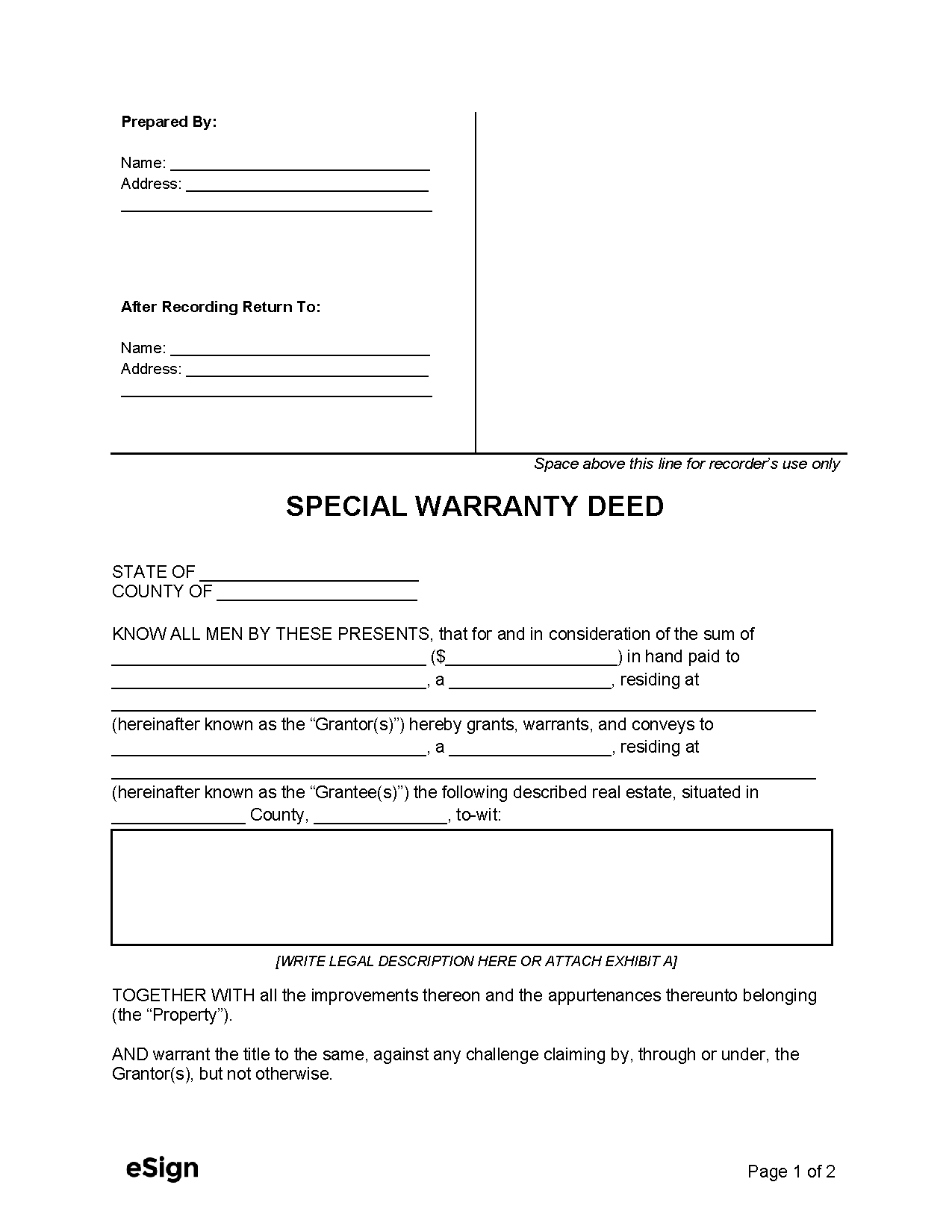 Special Warranty Deed – Similar to a general warranty deed, but its warranty only covers the grantor’s time as owner. Special Warranty Deed – Similar to a general warranty deed, but its warranty only covers the grantor’s time as owner.
|
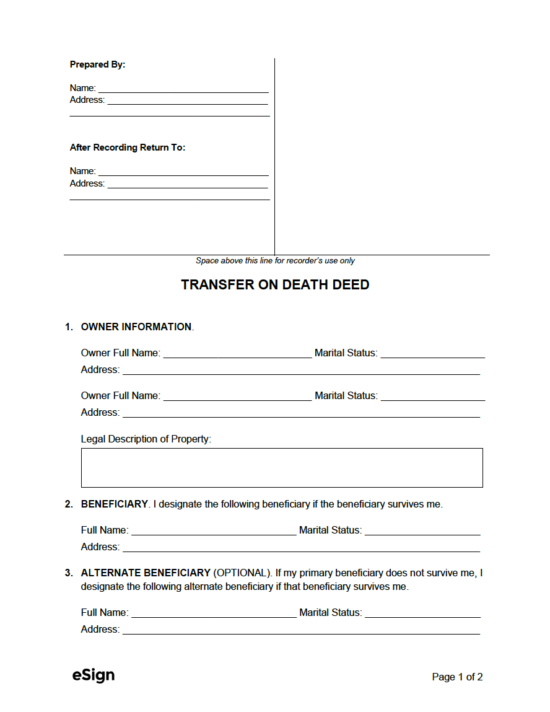 Transfer on Death Deed (TODD) – Arranges for property to be transferred at the time of the grantor’s death. Recognized in 32 states. Transfer on Death Deed (TODD) – Arranges for property to be transferred at the time of the grantor’s death. Recognized in 32 states.
|
What is a Deed?
A deed is a legal document used for transferring legal title to a property from a grantor to a grantee. By signing and recording a deed, the grantor conveys their ownership interest to the grantee and creates a public record of the transfer.
Deeds can also correct or change the listed owners and information on a title. In some states, certain deed types can be used to name a beneficiary to receive ownership after the grantor’s death or to transfer title as collateral for a home loan.
Signing Requirements
The table below contains the signing requirements for deeds in all 50 states. Most states require notarization before a deed can be recorded.
View State Requirements |
||||
| STATE | REQUIREMENTS | STATUTE | ||
| Alabama | Notarization | § 35-4-20 | ||
| Alaska | Notarization | § 34-15-150 | ||
| Arizona | Notarization | § 33-401(B) | ||
| Arkansas | Notarization AND 2 Witnesses | §§ 18-12-104, 18-12-201 | ||
| California | Notarization | § 27287 | ||
| Colorado | Notarization | §§ 38-30-126(1), 38-35-103 | ||
| Connecticut | Notarization AND 2 Witnesses | § 47-5 | ||
| Delaware | Notarization | § 122 | ||
| Florida | Notarization AND 2 Witnesses | §§ 695.26(1)(d), 689.01(1) | ||
| Georgia | Notarization AND 1 Witness | §§ 44-2-15, 44-5-30 | ||
| Hawaii | Notarization | § 502-41 | ||
| Idaho | Notarization | § 55-805 | ||
| Illinois | Notarization | § 765 ILCS 5/20 | ||
| Indiana | Notarization | § 32-21-2-3(a) | ||
| Iowa | Notarization | § 558.20 | ||
| Kansas | Notarization | § 55-2211 | ||
| Kentucky | Notarization | § 382.130 | ||
| Louisiana | 2 Witnesses AND Notarization | § 1839, 1833 | ||
| Maine | Notarization | § 203 | ||
| Maryland | Notarization | § 4-101(a)(1) | ||
| Massachusetts | Notarization | § 183-29 | ||
| Michigan | Notarization | § 565.8 | ||
| Minnesota | Notarization | § 507.24(Subd. 2)(a) | ||
| Mississippi | Notarization | § 89-3-1(1) | ||
| Missouri | Notarization | §§ 442.130, 15.152.030 | ||
| Montana | Notarization | § 70-21-203 | ||
| Nebraska | Notarization | § 76-211 | ||
| Nevada | Notarization | § 111.105 | ||
| New Hampshire | Notarization | § 477:3 | ||
| New Jersey | Notarization | § 46:14-2.1(a) | ||
| New Mexico | Notarization | § 14-8-4 | ||
| New York | Notarization | RPP § 306 | ||
| North Carolina | Notarization | § 47-17 | ||
| North Dakota | Notarization | § 47-19-03 | ||
| Ohio | Notarization | § 5301.01(A) | ||
| Oklahoma | Notarization | 16 O.S. § 1-26 | ||
| Oregon | Notarization | § 93.410 | ||
| Pennsylvania | Notarization | 21 P.S. § 42 | ||
| Rhode Island | Notarization | § 34-11-1 | ||
| South Carolina | Notarization AND 2 Witnesses (Notary can act as 1 witness) | § 30-5-30(B) | ||
| South Dakota | Notarization | § 43-25-26 | ||
| Tennessee | Notarization | § 66-22-101(a) | ||
| Texas | Notarization OR 2 Witnesses | § 12.001(b) | ||
| Utah | Notarization | § 57-3-101(1) | ||
| Vermont | Notarization | 27 V.S.A. § 341(a) | ||
| Virginia | Notarization | § 55.1-600 | ||
| Washington | Notarization | § 64.04.020 | ||
| West Virginia | Notarization | § 39-1-2 | ||
| Wisconsin | Notarization | §§ 706.05(2)(a), 706.06 | ||
| Wyoming | Notarization | § 34-1-113 | ||
Where to Record a Deed
After signing the deed in accordance with state requirements, the grantor must file it with the county recorder or register of deeds.
The directory of recording offices for each state is listed in the table below.
Important Terms to Know
- Conveyance – The transfer or assignment of property ownership from one person or entity to another.
- Encumbrance – A claim against a property, such as:
- CC&Rs (Conditions, Covenants, and Restrictions) – Also known as deed restrictions, these can restrict the usage, appearance, and maintenance of the property.
- Easements – Provides a third party with the right to use the land, such as a right-of-way or a utility line.
- Encroachment – Occurs when an object extends into the property. Examples include trees, shrubbery, fences, or sheds and other outbuildings.
- Liens – A lien is a legal claim against a property that secures a debt. The property can be seized if the debt isn’t repaid.
- Grantee – The person or entity receiving ownership of the property.
- Grantor – The person or entity transferring property to the grantee.
- Notary Acknowledgment – A notarial act where the officer confirms a signer’s identity and their willingness to sign the document. Required in virtually all deed signings.
